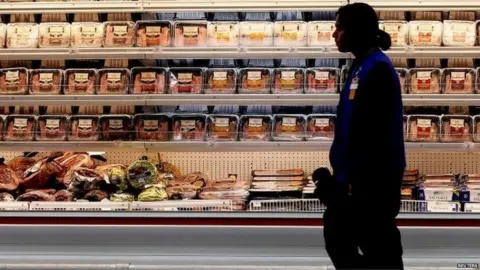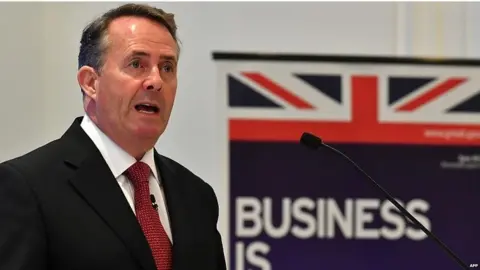Liam Fox downplays UK-US chlorinated chicken differences
 Reuters
ReutersLiam Fox has downplayed talk that a future US-UK trade deal after Brexit could be threatened by disagreements over chlorinated chicken imports.
The international trade secretary said the issue of whether the current UK ban on chlorine-washed poultry would be lifted was "a detail of the very end stage of one sector" of future talks.
The EU bans imports on health grounds but free market groups want a rethink.
Downing Street said any trade deal must work for both consumers and farmers.
Mr Fox is in Washington DC for two days of talks with US officials about the existing transatlantic trade relationship and how this will change once the UK leaves the EU in March 2019.
Although the UK cannot seal a free trade deal of its own with the US until it leaves the EU, both sides have expressed a desire to make quick progress and to scope out some of the barriers to an expedited deal.
The EU currently bans imports of poultry meat which is rinsed in chlorine and it will be up to the UK to decide, after it leaves the EU, whether this ban stays in place.
Environmental campaigners have expressed concerns that the UK's desire for a quick deal could pave the way for the ban to be lifted as well as a loosening of other restrictions on imports of unlabelled genetically modified (GM) foods and beef from cattle implanted with growth hormones.
Concerns about differing EU and US standards were among issues that resulted in the two sides failing to agree a comprehensive trade and investment partnership last year.

What is chlorinated chicken?
In the US, it is legal to wash chicken carcasses in strongly chlorinated water.
Producers argue that it mitigates the spread of microbial contamination from the animal's digestive tract to the meat while regulators agree
The practice is banned in the EU on health grounds, arguing it could increase the risk of bacterial-based diseases such as salmonella on the grounds that dirty abattoirs with sloppy standards would rely on it as a decontaminant rather than making sure their basic hygiene protocols were up to scratch.
There are also concerns that such "washes" would be used by less scrupulous meat processing plants to increase the shelf-life of meat, making it appear fresher than it really is.

Asked whether he would be happy eating chlorinated chicken, Mr Fox suggested that the British media was "obsessed" by the issue and asked whether reporters would be shunning US chicken during their visit.
In what he described as the "complex" process of negotiating an over-arching deal to advance the mutual prosperity of the US and UK people, he suggested the issue ranked low down on his list of current priorities.
Speaking more broadly, Mr Fox said discussions about global trade too often focused around talk about the interests of producers and jobs rather than the needs of consumers as people.
"We have to make the case for free trade and consumer gains," he said.
On Sunday, he conceded that reciprocal access to markets for agri-food products were one of the hardest-fought elements of trade deals and often among the last areas to be agreed.
There have been reports of disagreement in the Cabinet over the issue of chicken imports.
 AFP
AFPEnvironment Secretary Michael Gove has said the UK will retain existing standards of environmental and animal welfare outside of the EU and that his goal was to improve them further.
Speaking last week, he said there would be "no compromise" on standards and that he believed being a world leader in free trade and animal welfare should not be incompatible.
Free market economists have called for the UK to permit imports of chlorinated chicken as a goodwill gesture to help facilitate a comprehensive trade deal.
The Adam Smith Institute said there was no evidence that eating chlorinated chicken in moderation posed any risk to human health.
In a report published on Monday, it said lifting restrictions would be good for hard-pressed consumers as a kilo of chicken was 21% cheaper in the US than its UK equivalent.
"Trade critics like to suggest that signing a deal with the USA will mean that Brits will be forced to eat unsafe produce," said its author Peter Spence.
"In reality, chlorinated chicken is so harmless that even the EU's own scientific advisers have declared that it is "of no safety concern."
"Agreeing to US poultry imports would help to secure a quick US trade deal, and bring down costs for British households. European opposition to US agricultural exports has held up trade talks for years."
Asked whether the government was guaranteeing to maintain EU-level food standards after Brexit, a Downing Street spokesman said: "Our position when it comes to food is that maintaining the safety and public confidence in the food we eat is of the highest priority
"Any future trade deal must work for UK farmers, businesses and consumers."
